Demolition Contractors Reigate
Find Demo Companies in Reigate
Receive multiple Demo Companies quotes for your project today! Compare profiles, reviews, accreditations, portfolio, etc... and choose the best service.
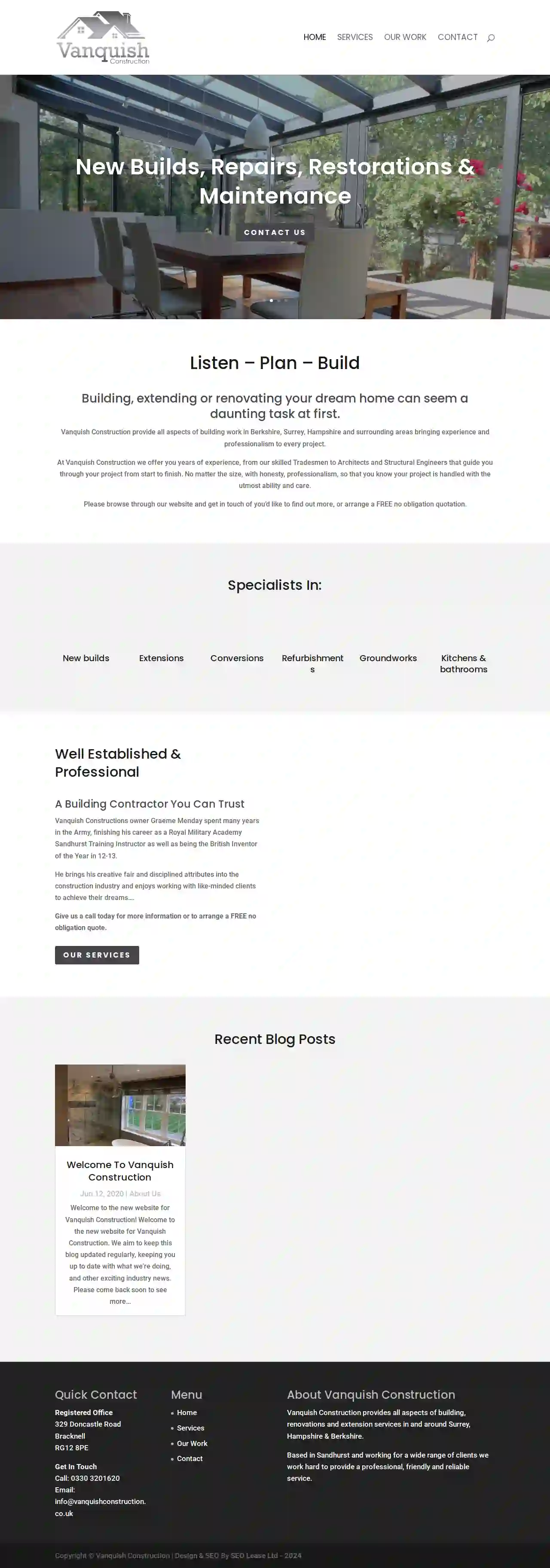
Vanquish Construction ltd
329 Doncastle Road, Bracknell, RG12 8PE, GBBuilding, extending or renovating your dream home can seem a daunting task at first. Vanquish Construction provide all aspects of building work in Berkshire, Surrey, Hampshire and surrounding areas bringing experience and professionalism to every project. At Vanquish Construction we offer you years of experience, from our skilled Tradesmen to Architects and Structural Engineers that guide you through your project from start to finish. No matter the size, with honesty, professionalism, so that you know your project is handled with the utmost ability and care. Please browse through our website and get in touch of you’d like to find out more, or arrange a FREE no obligation quotation. Well Established & Professional A Building Contractor You Can Trust Vanquish Constructions owner Graeme Menday spent many years in the Army, finishing his career as a Royal Military Academy Sandhurst Training Instructor as well as being the British Inventor of the Year in 12-13. He brings his creative fair and disciplined attributes into the construction industry and enjoys working with like-minded clients to achieve their dreams…. Give us a call today for more information or to arrange a FREE no obligation quote.
- Services
- Why Us?
- Gallery
Get Quote
J Searle Contractors Ltd
51 reviewsThe Pines, Green Lane East, Guildford, GU3 2JL, GBWelcome To J Searle Contractors Ltd J Searle Contractors are a leading groundworks company, offering a comprehensive range of services to both domestic and commercial clients across the South-East regions. We have been delivering our services across the South-East for over 3 generations. Professional Groundwork Specialists At J Searle Contractors Ltd, we take pride in being a leading provider of comprehensive groundwork services tailored to meet the diverse needs of our clients. With a rich legacy of expertise and commitment, we offer a range of groundwork solutions, ensuring precision, safety, and environmental responsibility during every project. Our Services J.Searle Contractors take pride in our reputation as being a reliable and trustworthy groundworks company with a focus on health and safety and environmental responsibility. We have been delivering our services across the South-East for over 3 generations.
- Services
- Why Us?
- Gallery
Get Quote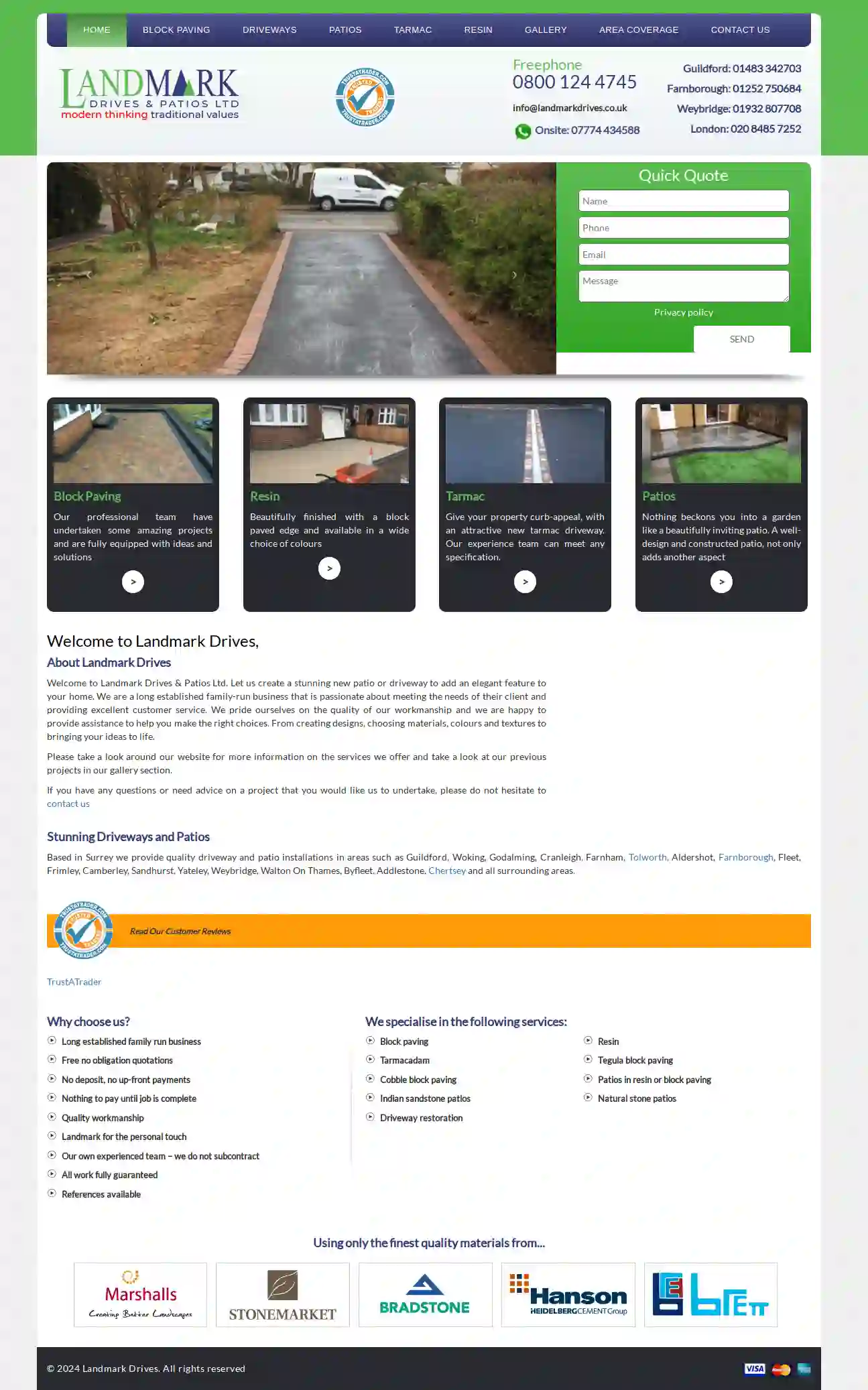
Landmark Drives & Patios Ltd
3.76 reviewsParrell Houe, 32 London Road, Parrell Houe 32 London Road, Surrey, GU1 2AB, GBWelcome to Landmark Drives, About Landmark Drives Welcome to Landmark Drives & Patios Ltd. Let us create a stunning new patio or driveway to add an elegant feature to your home. We are a long established family-run business that is passionate about meeting the needs of their client and providing excellent customer service. We pride ourselves on the quality of our workmanship and we are happy to provide assistance to help you make the right choices. From creating designs, choosing materials, colours and textures to bringing your ideas to life. Please take a look around our website for more information on the services we offer and take a look at our previous projects in our gallery section. If you have any questions or need advice on a project that you would like us to undertake, please do not hesitate to contact us Stunning Driveways and Patios Based in Surrey we provide quality driveway and patio installations in areas such as Guildford, Woking, Godalming, Cranleigh, Farnham, Tolworth, Aldershot, Farnborough, Fleet, Frimley, Camberley, Sandhurst, Yateley, Weybridge, Walton On Thames, Byfleet, Addlestone, Chertsey and all surrounding areas. Read Our Customer Reviews TrustATrader Why choose us? Long established family run business Free no obligation quotations No deposit, no up-front payments Nothing to pay until job is complete Quality workmanship Landmark for the personal touch Our own experienced team – we do not subcontract All work fully guaranteed References available
- Services
- Why Us?
- Gallery
Get Quote
Chysauster Ancient Village
4.4250 reviewsEwell, GBEnglish Heritage: Exploring England's Rich History English Heritage is a charity dedicated to preserving and sharing England's rich history and heritage. We care for over 400 historic places, from ancient monuments to grand castles, offering visitors a glimpse into the past and a chance to connect with England's fascinating story. Our mission is to inspire people to explore, understand and care for England's past. We achieve this through a variety of initiatives, including: Providing access to our historic places for visitors to enjoy and learn from. Carrying out conservation and restoration work to protect our heritage for future generations. Developing educational programs and resources to engage people of all ages in history. Working with communities to ensure that our heritage is valued and celebrated. We believe that everyone should have the opportunity to experience and learn from England's history. We offer a range of programs and services to make our historic places accessible to all, including: Family-friendly events and activities Accessible facilities for visitors with disabilities Educational resources for schools and community groups Volunteer opportunities for those who want to get involved in preserving our heritage We are committed to being a responsible and sustainable organization. We are working to reduce our environmental impact and to ensure that our historic places are managed in a way that benefits both people and the environment. Join us on a journey through time and discover the wonders of England's past.
- Services
- Why Us?
- Gallery
Get Quote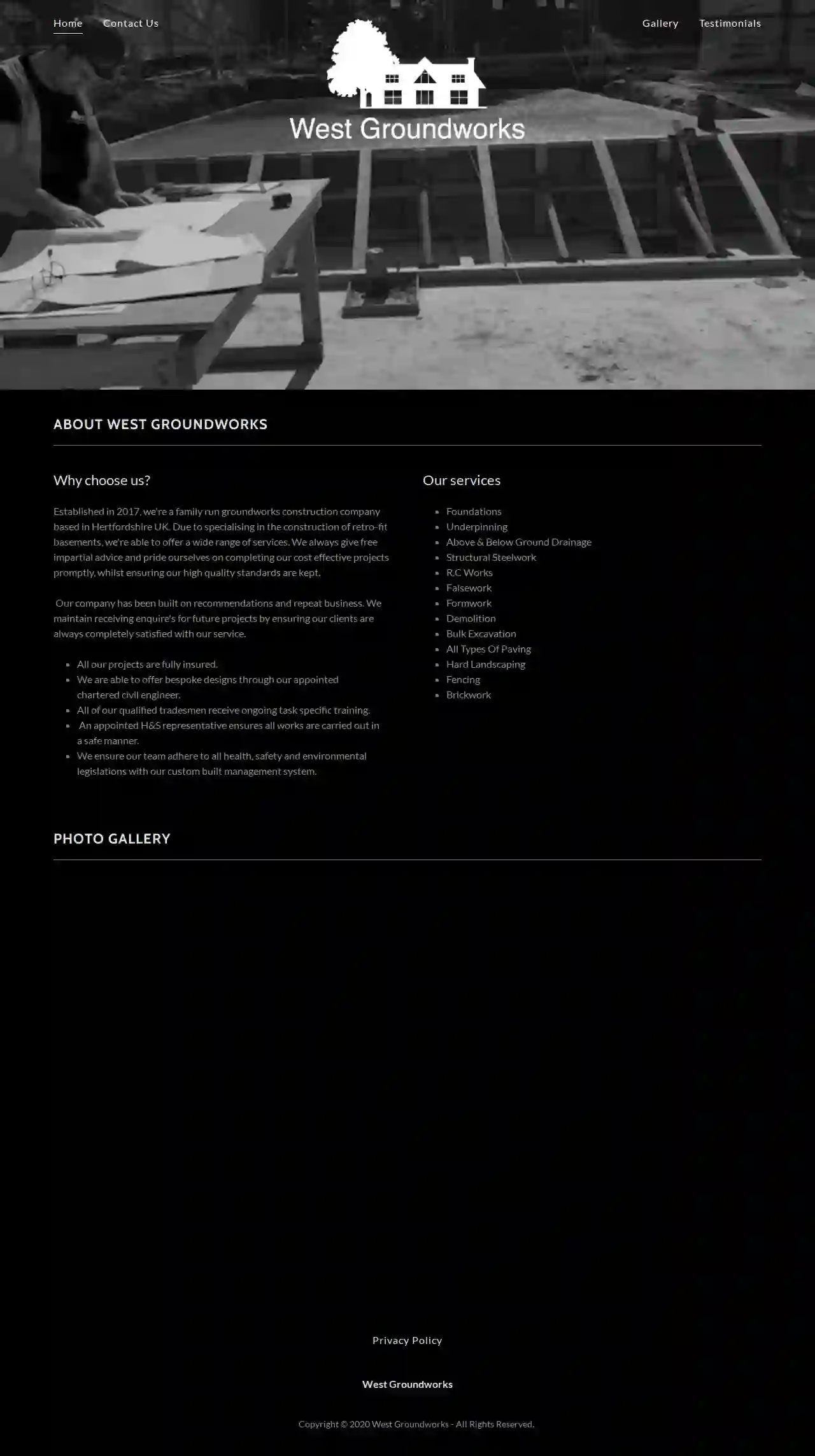
West Groundworks Ltd
41 reviews27 Jarden, Letchworth Garden City, SG6 2NR, GBAbout West Groundworks Established in 2017, West Groundworks is a family-run groundworks construction company based in Hertfordshire, UK. We specialize in the construction of retro-fit basements, offering a wide range of services to meet your needs. We are committed to providing free, impartial advice and take pride in completing our cost-effective projects promptly while maintaining our high-quality standards. Our company has been built on recommendations and repeat business, ensuring our clients are always completely satisfied with our service. Why choose us? All our projects are fully insured. We offer bespoke designs through our appointed chartered civil engineer. All of our qualified tradesmen receive ongoing task-specific training. An appointed H&S representative ensures all works are carried out in a safe manner. We ensure our team adheres to all health, safety, and environmental legislations with our custom-built management system.
- Services
- Why Us?
- Gallery
Get Quote
Egan Builders & Son
54 reviews3 Newbury Gardens, Stoneleigh, Epsom, Surrey, KT19 0NS, GBInvest in Your Home With Our Builders in Epsom, Cheam, Surrey & London | Egan Builders Ltd Welcome to the online home of Egan Builders Ltd, a team of development specialists here to help you invest in your property, and carve out a space you can be proud of. Boasting over 50 years of experience, we’re a building company well-known throughout the Cheam, Epsom, New Malden and Wimbledon areas for our outstanding workmanship, and commitment to quality customer service. Managing projects from first point of contact till handover, we can assist you through the construction of anything from home extensions, loft conversions and garage conversions, to the delivery of property renovations and home refurbishments. Every project we take on is bespoke, and looks to transform your vision into a reality without compromise. Complying with all relevant building regulations, and using exceptional materials which come with all product warranties firmly intact, we look to make the decision to invest in a property one that you never doubt, not even for a second. As a family-run company, our reputation means everything to us. And that’s why our worth ethic is unquestionable, and results in projects being delivered on time, and within budget. Our building company was established 35 years ago, and initially focused on smaller projects. Having built up our team and cut our teeth in the competitive world of property development, we have the scale and ability to tackle even the most demanding of house extensions, loft conversions, garage conversions, property renovations and home refurbishments. Always aware of where we’ve come from, clients around Cheam, Epsom, New Malden, Wimbledon, and the wider Surrey and Greater London areas, can expect a friendly and personable experience when bringing in Egan Builders Ltd. While some builders might expect you to be fully prepared and ready for a project before making the call, we’re here to help you figure out how to most effectively improve and invest in your home through the provision of expert, no obligation advice. We’ll guide you through the entire process, and even assist with securing planning permission for structural works and alterations. From planning, to first breaking ground, through to the finishing decorative touches that can elevate a project to truly outstanding, our builders will be with you on the journey and ensure total satisfaction with the finished works.
- Services
- Why Us?
- Gallery
Get Quote
NH Earthworks
4.69 reviewsBarrington, NH, GBNH Earthworks – The Local Experts in Demolition and Excavation If you’re looking for a reliable, experienced, and customer-focused Demolition and Excavation contractor, look no further than NH Earthworks. We are a family-owned and operated business with over 20 years of experience in the industry. NH Earthworks is a premier excavation and earthwork service provider that proudly serves Barrington, NH, and beyond. We are dedicated to delivering high-quality, environmentally sustainable solutions for all your earthwork needs. Our team of skilled professionals uses advanced techniques and equipment to ensure the best outcomes for your projects. Whether you’re in Barrington or neighboring areas, we’re committed to providing exceptional customer service, maintaining safety standards, and completing projects efficiently. Choose NH Earthworks – your trusted local expert for excavation, site preparation, and more in Barrington, NH, and surrounding communities. Choosing NH Earthworks for your excavation and demolition needs is a decision backed by positive customer feedback and a strong reputation in the Barrington, NH area. Known for our professional services, timely completion of projects, and excellent customer relations, NH Earthworks consistently delivers quality work. NH Earthworks is here for all your Demolition & Excavation needs! Servicing all of NH and southern ME, call us today!
- Services
- Why Us?
- Gallery
Get Quote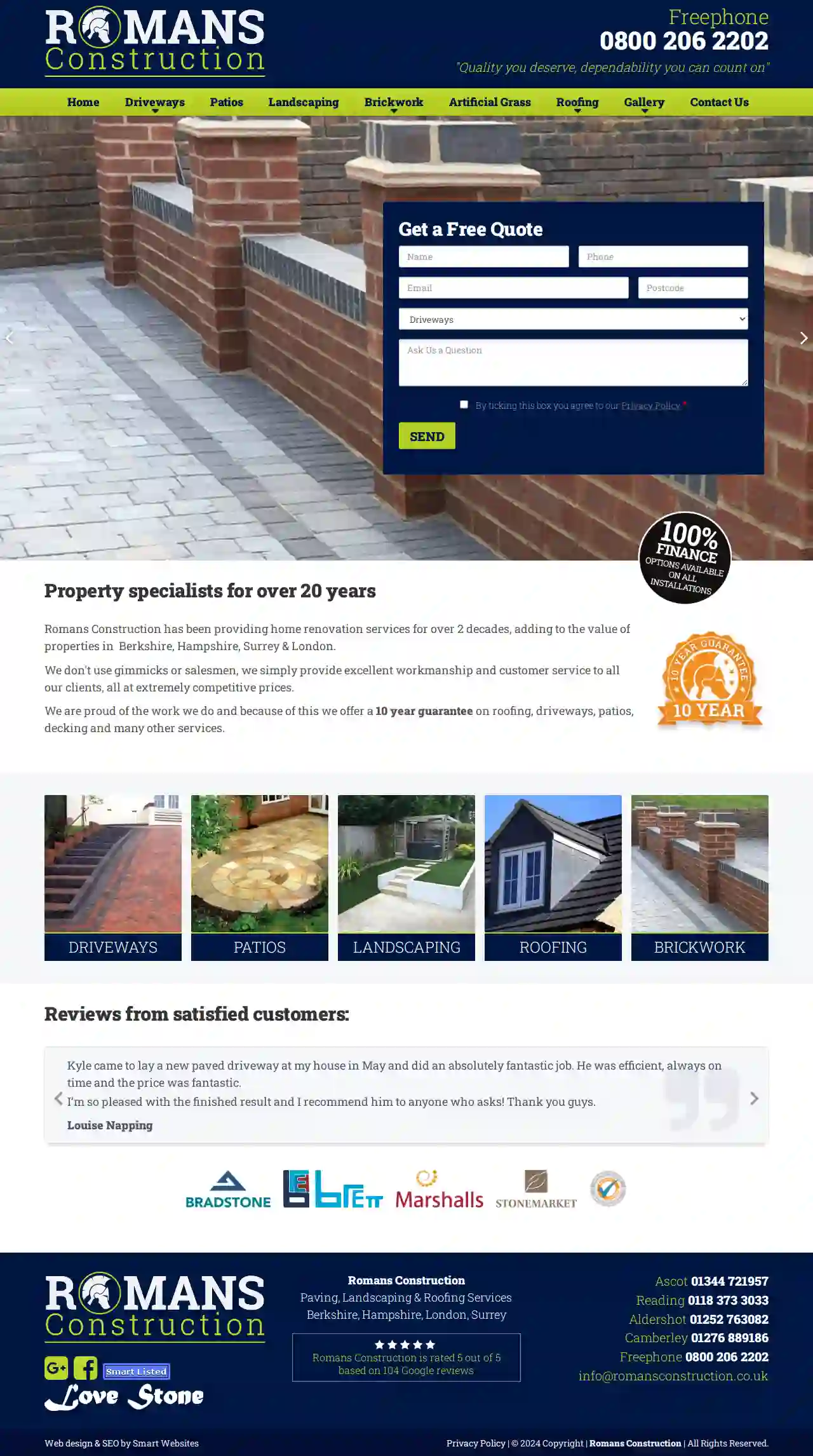
Romans Construction Ltd
5105 reviewsStudley Court Mews, Guildford Road, Chobham, GU24 8EB, GBProperty specialists for over 20 years Romans Construction has been providing home renovation services for over 2 decades, adding to the value of properties in Berkshire, Hampshire, Surrey & London. We don't use gimmicks or salesmen, we simply provide excellent workmanship and customer service to all our clients, all at extremely competitive prices. We are proud of the work we do and because of this we offer a 10 year guarantee on roofing, driveways, patios, decking and many other services.
- Services
- Why Us?
- Testimonials
- Gallery
Get Quote
Midas Construction Group LTD
51 reviewsFetcham Grove, Riverbridge house, Guildford Rd, Fetcham, Leatherhead, KT22 9AD, GBRoyal Lofts & Extensions Contact us today for a free Quotation Your Extension Specialists Our team are available for site visits and free quotations. Why Choose Our Services? We pride ourselves on being able to create the perfect space for any customer. Over the years we have built countless bedrooms and bathrooms, but we also know a thing or two about building something the customer specifically has in mind, too. Affordable, bespoke loft conversions For us, building bespoke loft conversions are our everyday. But what separates us from the rest is our commitment to collaborate with you; to ensure we create a truly unique, not to mention affordable, loft conversion that will truly turn your house into your dream home. Specialist Team From our fitters to Head Office staff, every person we work with has trade experience. can trust. Price Planning We’ll plan with you every step of the way to ensure you know exactly where your money is going. going. 10 Year Guarantee 10 year insurance backed guarantee providing you with complete peace of mind. Tailor Made Designs Truly bespoke loft conversions that are meticulously planned for you. We’ll take care of it all, from planning to build. Get Started Get Started Here Case Studies For us, building bespoke loft conversions are our everyday. But what separates us from the rest is our commitment to collaborate with you BALHAM WeybridgeRoyal Lofts have over 20 years experience and will fulfill your dream extension 02034 110 411 Contact Us Today But it is our aim to be the most widely recognised construction partner across London and the South East of England. Our reputation has seen us through over three decades of successful projects and collaborations with thousands of people just like you. We know projects like this can be daunting, that’s why we commit to making the entire process as smooth and easy as possible so you can focus on the positive end result! That way, our hard work and reputation can continue to grow past all areas of London, whilst leaving you over the moon with your new renovation. Working with the neighbours Completed job on time 100% satisfaction Its Good To Talk Our Team is ready and waiting for any query you may have .Contact us today for the very best information and direction for your home extensions. With over 20 years experience you can rely and trust Royal Lofts & Extensions 02034 110 411 For your free survey or some advice call: 02034 110 411
- Services
- Why Us?
- Gallery
Get Quote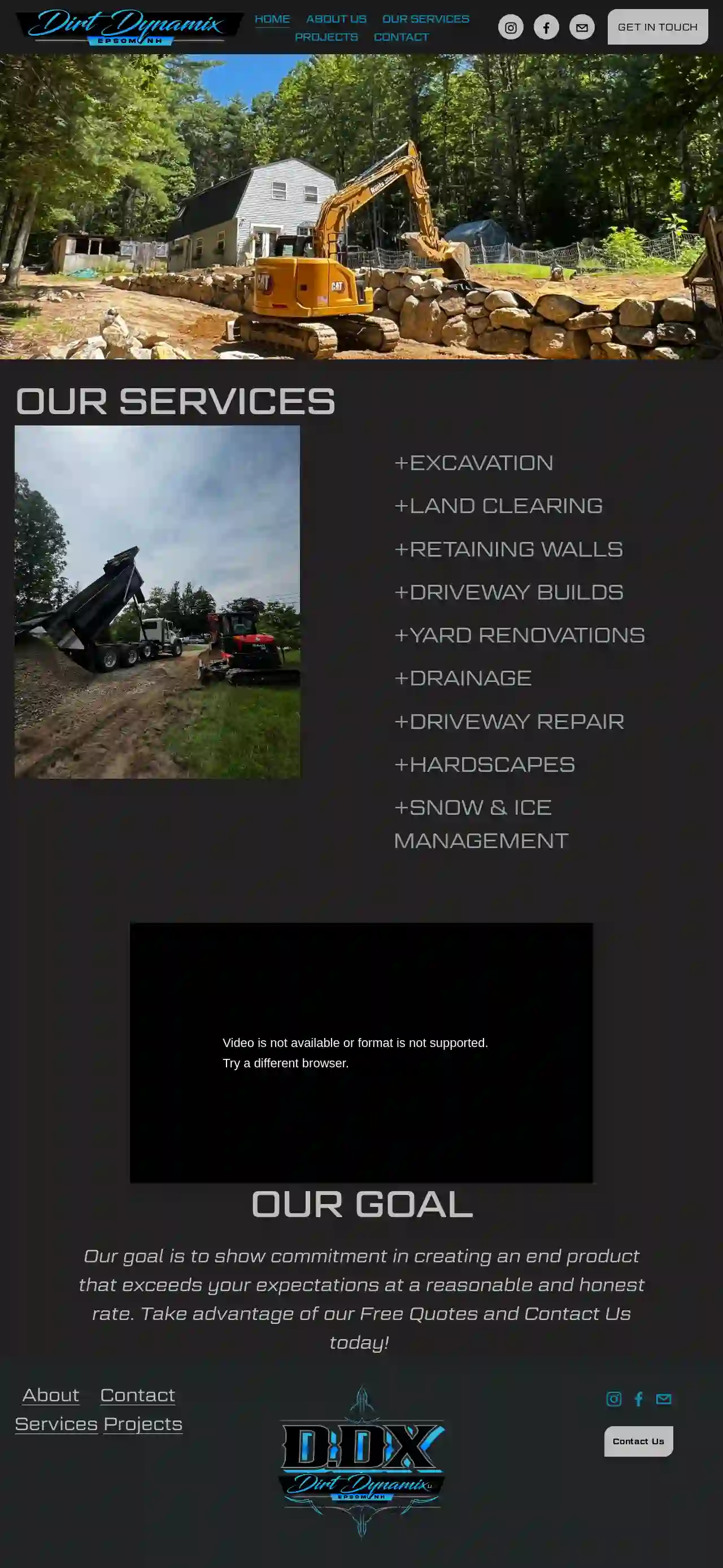
Dirt Dynamix LLC
55 reviewsEpsom, GBOur goal Our goal is to show commitment in creating an end product that exceeds your expectations at a reasonable and honest rate. Take advantage of our Free Quotes and Contact Us today!
- Services
- Why Us?
- Gallery
Get Quote
Over 13,059+ Excavation Contractors on our platform
Our excavation contractors operate in Reigate & surrounding areas!
ExcavationHQ has curated and vetted the Best Excavation Contractors near Reigate. Find the most reliable business today.
Frequently Asked Questions About Demolition Contractors
- Enclosure: Sealing off the asbestos-containing material to prevent fiber release.
- Encapsulation: Coating the asbestos-containing material with a sealant to bind the fibers.
- Removal: Carefully removing the asbestos-containing material and disposing of it safely.
- 'Can I see proof of your licensing and insurance?' Verify their credentials and coverage.
- 'What experience do you have with projects like mine?' Ensure they have relevant expertise.
- 'Can you provide references from past clients?' Check their reputation and customer satisfaction.
- 'What are your safety protocols?' Prioritize contractors who emphasize safety.
- 'How will you handle hazardous materials?' Ensure they have proper procedures for asbestos or lead abatement.
- 'What is your timeline for completing the project?' Understand the project duration.
- 'How will you manage noise, dust, and debris?' Discuss mitigation measures for minimizing disruption.
- 'What are your payment terms?' Clarify payment schedules and any required deposits.
- Safety: Experienced contractors have the knowledge, skills, and safety training to execute demolitions safely, minimizing risks to workers and surrounding areas.
- Efficiency: Contractors have the specialized equipment and expertise to complete demolitions efficiently, saving time and reducing project costs.
- Compliance: Reputable contractors are familiar with local regulations and permitting requirements, ensuring compliance and avoiding legal issues.
- Waste Management: Contractors have waste management plans to handle debris responsibly, including recycling and proper disposal.
- Liability Protection: Insured contractors protect you from financial responsibility for accidents or damages during the demolition process.
What are the different methods of asbestos abatement?
What questions should I ask a demolition contractor before hiring them?
What are the benefits of hiring a professional demolition contractor?
What is a demolition bond?
What are the different methods of asbestos abatement?
- Enclosure: Sealing off the asbestos-containing material to prevent fiber release.
- Encapsulation: Coating the asbestos-containing material with a sealant to bind the fibers.
- Removal: Carefully removing the asbestos-containing material and disposing of it safely.
What questions should I ask a demolition contractor before hiring them?
- 'Can I see proof of your licensing and insurance?' Verify their credentials and coverage.
- 'What experience do you have with projects like mine?' Ensure they have relevant expertise.
- 'Can you provide references from past clients?' Check their reputation and customer satisfaction.
- 'What are your safety protocols?' Prioritize contractors who emphasize safety.
- 'How will you handle hazardous materials?' Ensure they have proper procedures for asbestos or lead abatement.
- 'What is your timeline for completing the project?' Understand the project duration.
- 'How will you manage noise, dust, and debris?' Discuss mitigation measures for minimizing disruption.
- 'What are your payment terms?' Clarify payment schedules and any required deposits.
What are the benefits of hiring a professional demolition contractor?
- Safety: Experienced contractors have the knowledge, skills, and safety training to execute demolitions safely, minimizing risks to workers and surrounding areas.
- Efficiency: Contractors have the specialized equipment and expertise to complete demolitions efficiently, saving time and reducing project costs.
- Compliance: Reputable contractors are familiar with local regulations and permitting requirements, ensuring compliance and avoiding legal issues.
- Waste Management: Contractors have waste management plans to handle debris responsibly, including recycling and proper disposal.
- Liability Protection: Insured contractors protect you from financial responsibility for accidents or damages during the demolition process.